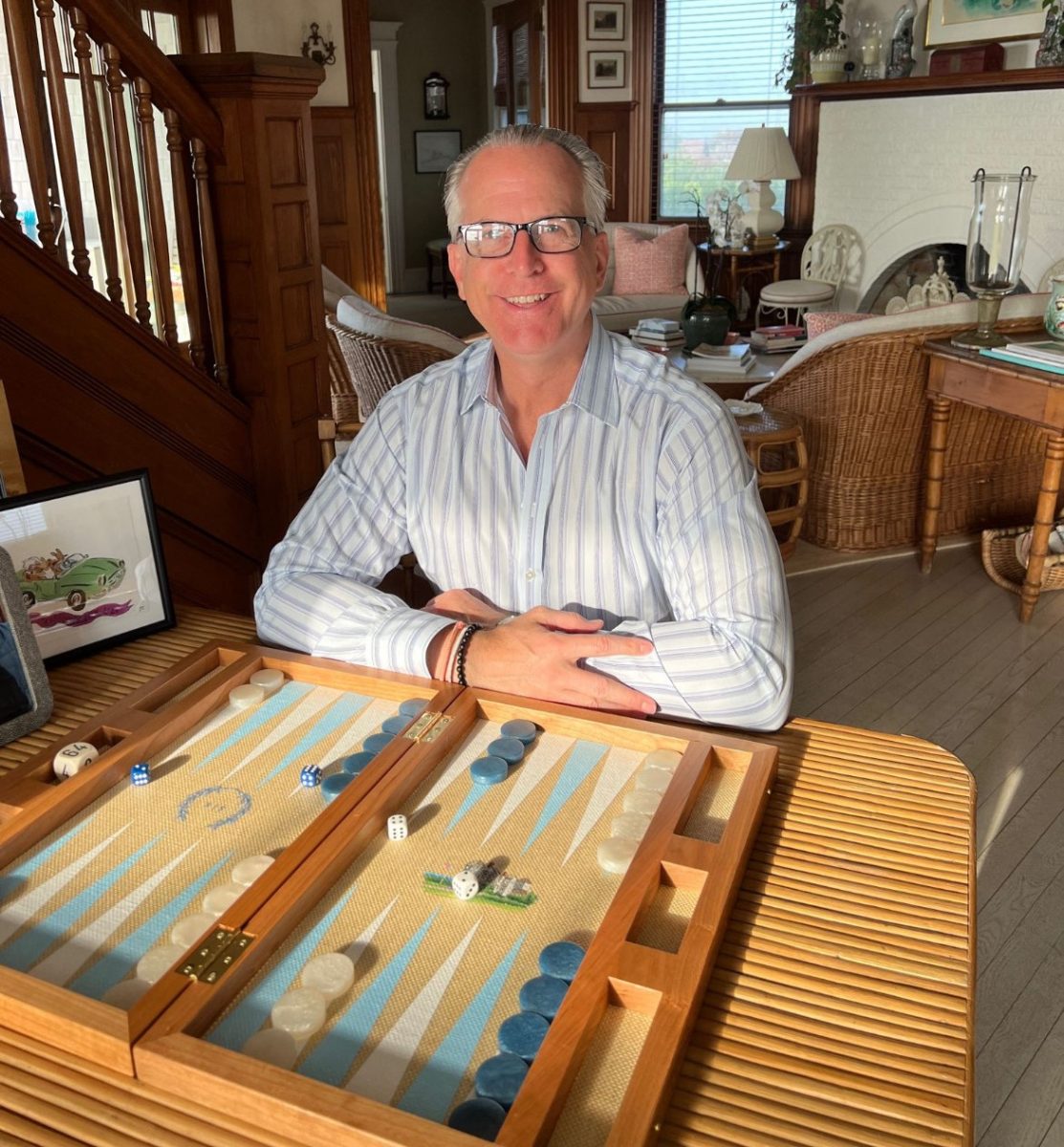Charles Manger is a professional backgammon player who runs the Billiards and Backgammon Committee at the Racquet and Tennis Club in New York City.
“I never thought that I would end up captaining teams for a club to go around and play in tournaments the way we are doing it,” Manger said.
Backgammon is typically a two-player game in which participants move their pieces based on the roll of dice, aiming to remove all their pieces from the board before their opponent does.
While the game may have set rules and an end objective, Manger said it is critical to identify the importance of learning the skill of adaptation, as strategies constantly change play by play.
“It’s very robust, it’s interactive, it changes,” Manger said. “You have to change based on the moves you’re making and what the opponent is making.”
Manger said his position requires him to set up tournaments across the country, as well as in London, with other backgammon clubs.
“Now we have seven tournaments around the country and we might do something in London next year, in June,” said Manger. “If you think about it, I mean, we didn’t, we didn’t have any of this before I got involved. Now, we have all these club tournaments. It’s nine against nine, and people love it.”
Manger, who has been playing backgammon for around 45 years, said he began learning the game at the age of 8 when his mother taught him the skills and mind-set needed in order to be a successful player.
“I learned a very conservative style of backgammon, which, when you play backgammon a lot like I do, you learn very quickly,” Manger said. “You have to play more aggressively because that’s really how you play to win.”
Moving away from friendly matches in his hometown, Manger began captaining teams in tournaments throughout New York. However, he said his career truly peaked when he became chairman of the Billiards and Backgammon Committee in New York.
“At the Racquet Club, they asked me to start running the program there about nine years ago, and I got involved with running it,” said Manger.
With his new position, Manger was able to collaborate with other clubs to run seven tournaments around the country.
Whilst there are various different levels of players at the club, Manger said he chooses “people based on their skill set” to participate in different tournaments.
Manger said the Billiards and Backgammon Committee stands as an important subject in the history of backgammon as they set the original foundations of the game.
“We published the laws of backgammon in the 1931 Scrivener Publishing,” said Manger. “The rules and laws were recently reinstated by marking and denoting, as well as recognizing the new clubs.”
Manger is drawn to backgammon’s balance, where both novice and pro players face similar challenges. He said the mix of chance, strategy, and risk-taking makes intellectual skill key to winning.
“It creates this level of opportunity for an inferior player, or somebody who’s more beginner or novice, to beat someone who is better,” Manger said. “And the reason is, you know, because there’s a chance involved, sometimes you can get the perfect roll, and I’ve seen it literally happen in games. It’s very frustrating at times, because you can think everything’s great, and then you get a roll that you didn’t want, yet you still have to make a decision and consider the risk and reward.”
Manger said he draws a connection between backgammon and the real world, explaining that just like life, the game presents unexpected challenges, “but it’s how you deal with it in that moment, and react, and look at what is the best thing to do at that specific moment.”
Manger said many children began playing backgammon with their parents during the pandemic, having considerably more time to learn the rules and fundamentals of the game.
“Once they get sort of hooked on it, they end up taking lessons or playing a lot on the computer just to learn how to play better,” Manger said. “It’s consistency, the better you’ll get, the more you play. If you play once a year, you’re never going to really improve. You play a lot during the year, you’re going to improve, just like any sport.”
While backgammon is played by people of all ages, Manger said the best age to begin is from 9 to 11, due to the mathematical and intellectual development of a child’s brain at that state.
“You have to understand a little bit of math before you get into it,” Manger said. “And people that are good typically come from backgrounds in math, finance, and bond trading and things of that nature, they do really well because it’s a risk-reward.”

Additionally, Manger said the Racquet and Tennis Club has sold 150 backgammon boards in the past year, reinforcing his belief in the game’s recent rise in popularity.
“And you know, if we sold another 50, hypothetically, that’s 200 boards,” Manger said. “If you look at the membership, you know, of local people, that’s well over 10 percent, that’s pretty significant. So that’s why I say I don’t think the game is going to die. I think, if anything, where it’s going to grow more and more.”
Manger said he identifies as a competitive player who thinks strategically about his moves during game play.
“I don’t like losing, but I also like to win,” Manger said. “I play relatively fast. I don’t rush, but there are times when I’ll stop and I’ll think, ‘Wait a second, here’s an inflection point in the game. What is the best move?’ And I have to think about it, and you want to put yourself in a good position to win.”
While growing up and playing the game, Manger said he was always taught about the importance of making a clear decision with your opponent if you will use the doubling cube, allowing a player to propose doubling the stakes
“If the doubling cube is in play and you decline, you never play it out,” Manger said. “You say ‘no,’ and you just have to get used to sticking to the rules and the formality and the etiquette.”
Additionally, whilst having played poker, chess, and blackjack in the past, Manger said he doesn’t seem to have a strong connection to the games, especially poker due to its “simplicity”. Rather, Manger fancies backgammon over other games due to its high concentration on mental skill, which gets followed by the idea of chance.
“In backgammon, it’s not physical skill, it’s mental skill, and then the dice,” said Manger, “The dice really gives everyone a chance. And that, to me, is a reason why I love the game.”

–Nov. 6, 2024–







